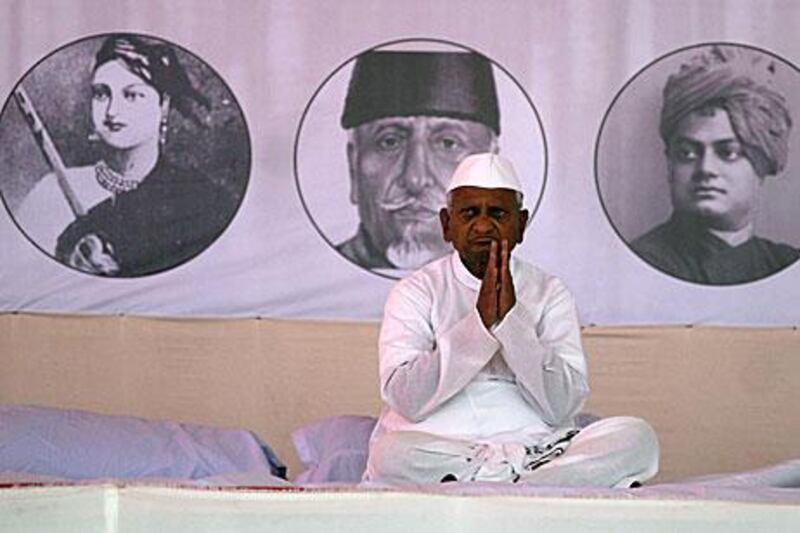NEW DELHI // The Indian parliament passed an anti-corruption bill after a contentious debate over a law that would create an independent committee to investigate politicians and civil servants.
Three hundred twenty-one legislators of the 543-member body voted in favour of the measure; 71 were against the bill.
The ruling Congress party introduced a new draft of the legislation last week, which it said addressed many of the opposition’s objections. But members of parliament of the Opposition parties, including the Hindu nationalist Bharatiya Janta Party (BJP) said yesterday the ombudsman bill, or Lokpal, gives too much power to Delhi, which violates states’ rights protected in the constitution.
“It is patently unconstitutional ... deeply flawed and tampers with the basic structure of our constitution,” said Sushma Swaraj, the leader of the Opposition and member of the BJP.
The main points of contention focus on the ambit of the ombudsman’s office and its powers of investigation.
The government bill offers only limited jurisdiction over the prime minister and requires the ombudsman to put any criminal probes in the hands of the government-controlled Central Bureau of Investigation.
Ms Swaraj also objected to the number of minority parties that could sit on the committee, saying it violated a Supreme Court order limiting those spots to under 50 per cent.
The cabinet added a clause last week that reserved five on the nine-member committee to appease parties such as the Bahujan Samaj Party, which represents minorities including Muslims and India’s lowest caste, the Dalits. The government is loathe to submit another draft of the bill to appease yet another segment of the opposition.
A number of opposition parties also want the ombudsman’s office to have its own, independent investigative team.
The prime minister, Manmohan Singh, said the opposition to the bill risked creating “chaos and anarchy”.
Mr Singh said creating an independent investigation team would be tantamount to creating a separate, unelected executive that was unaccountable to parliament or the Indian people.
“Let us not create something that will destroy all that we cherish, all in the name of combating corruption. Let us remember that the road to hell is paved with good intentions,” he said.
However, he said he was confident the bill would pass by Thursday.
The bill “lives up to the promise that members of this house collectively made to the people of the country,” Mr Singh said. “It is a serious business and must eventually be performed by all of us who have been constitutionally assigned. Others can persuade and their voices heard, but the decision must rest with us.”
Mr Singh’s comment was a clear message to the activist Anna Hazare, 74, who began a three-day fast in Mumbai to protest against Congress’s version of the bill.
Mr Hazare claimed the bill was an attempt to fool the country and its people, because it does not take a tough enough stand against corruption, especially among politicians.
“The government has betrayed the people ... at some point, the people will teach you (the government) a lesson,” he said. “You have not seen what people power is. It is more powerful than parliament.”
The parliament’s winter session was extended until tomorrow, with assemblies specially dedicated to debating the bill.
sbhattacharya@thenational.ae
* With additional reporting by Agence France-Presse





